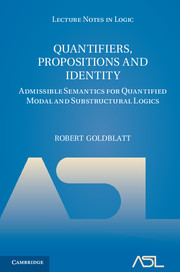 Quantifiers, Propositions and Identity
Quantifiers, Propositions and Identity Published online by Cambridge University Press: 07 September 2011
Substitution for predicate letters is a syntactically intricate inference procedure that is derivable in standard systems of non-modal quantificational logic. It allows a new theorem to be deduced from a given theorem ϕ by replacing an atomic formula Pτ1 ··· τn within ϕ by another formula ψ, of arbitrary complexity, involving the terms τ1, …, τn. The intricacy comes in stating the restrictions that must be placed on free variables of ϕ and ψ for the substitution to be allowed.
Church [1956, p. 289] gives some historical notes on this rule, pointing out that it was inadequately stated in early works of Hilbert and Ackerman, Carnap, and Quine; and first correctly stated, but not in full generality, in Hilbert and Bernays's Grundlagen der Mathematik in 1934. Church himself calls the predicate letter P a functional variable, viewing it as a variable whose values are propositional functions of individuals. In non-modal logic, this means that P is interpreted as an n-ary function Un → {truth, falsehood} from individuals to truth-values.
Intuitively, a logic that is closed under substitution for predicate letters is one whose theorems represent “universal laws”, expressing properties that hold of all predicates, i.e. hold no matter what interpretation is given to the predicate letters, hence hold no matter what formulas are (correctly) substituted for them.
To save this book to your Kindle, first ensure [email protected] is added to your Approved Personal Document E-mail List under your Personal Document Settings on the Manage Your Content and Devices page of your Amazon account. Then enter the ‘name’ part of your Kindle email address below. Find out more about saving to your Kindle.
Note you can select to save to either the @free.kindle.com or @kindle.com variations. ‘@free.kindle.com’ emails are free but can only be saved to your device when it is connected to wi-fi. ‘@kindle.com’ emails can be delivered even when you are not connected to wi-fi, but note that service fees apply.
Find out more about the Kindle Personal Document Service.
To save content items to your account, please confirm that you agree to abide by our usage policies. If this is the first time you use this feature, you will be asked to authorise Cambridge Core to connect with your account. Find out more about saving content to Dropbox.
To save content items to your account, please confirm that you agree to abide by our usage policies. If this is the first time you use this feature, you will be asked to authorise Cambridge Core to connect with your account. Find out more about saving content to Google Drive.